When it comes to e-commerce platforms, there are so many different features and capabilities, and the price points range so greatly that it can be difficult to figure out which is the best.
Some are made specifically with new businesses in mind, and others are designed for massive corporations. Some e-commerce platforms work best with experienced developers who are seasoned in the web-design space, and others still are created for those with no coding experience at all.
No matter what your needs and skills are, there are a multitude of e-commerce platforms that are sure to suit your needs as a business, including many open source platforms that you can utilize to build out your e-commerce storefronts.
But which of these platforms are the best for those interested in open source features? Read on for our roundup of the best open source e-commerce platforms.
1. WooCommerce
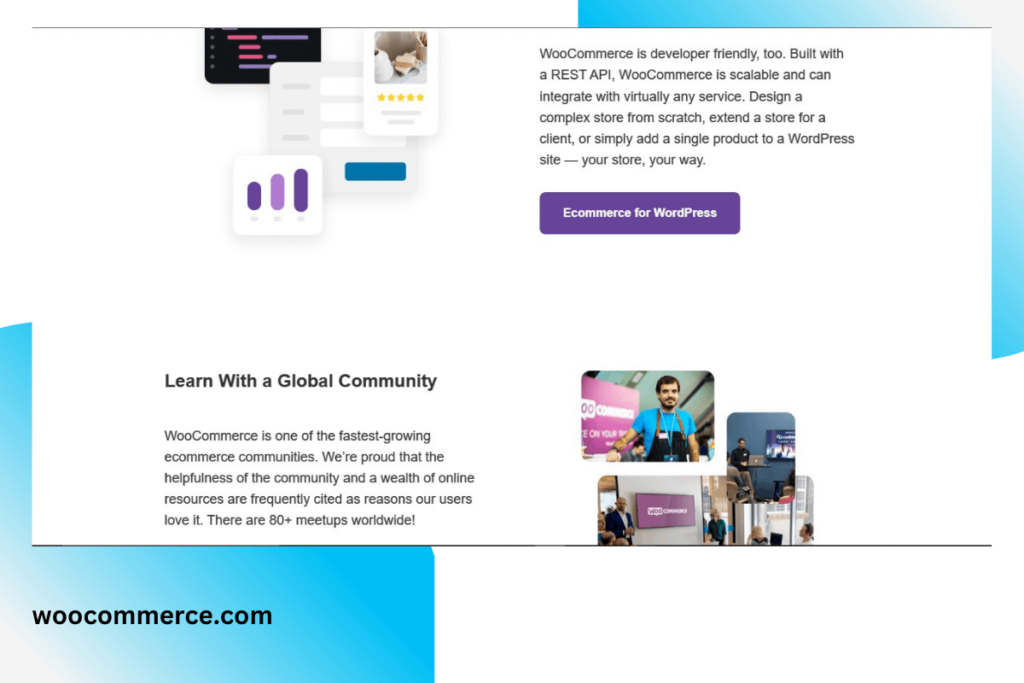
WooCommerce frequently tops most e-commerce platform lists, thanks to its easy-to-use interface and WordPress integration. Trusted by everyone from budding startups to global agencies, WooCommerce makes it easy for businesses of any size to launch an e-commerce presence.
Why is it great? WooCommerce is an open source e-commerce tool that allows for seamless integration into any WordPress-hosted site.
The upside to WooCommerce is that it’s easy enough to be used by the average person with even the most limited development experience; however it is robust enough to be developer-friendly, too. With endless customization options, businesses big and small can fully brand their storefronts and build clean, professional pages. And with the added bonus of the WooCommerce marketplace, merchants can integrate any number of add-ons and extensions, including Google Ads, Stripe, Square, PayPal, MailChimp, TaxJar, and more.
Thanks to the WooCommerce mobile app, business owners can manage their storefronts on-the-go, with the ability to create product listings, process orders, and review analytics in real time, from anywhere.
How much does it cost? The WooCommerce plugin is free for WordPress users. A small fee is charged per transaction, and premium themes and features may cost extra.
2. Magento
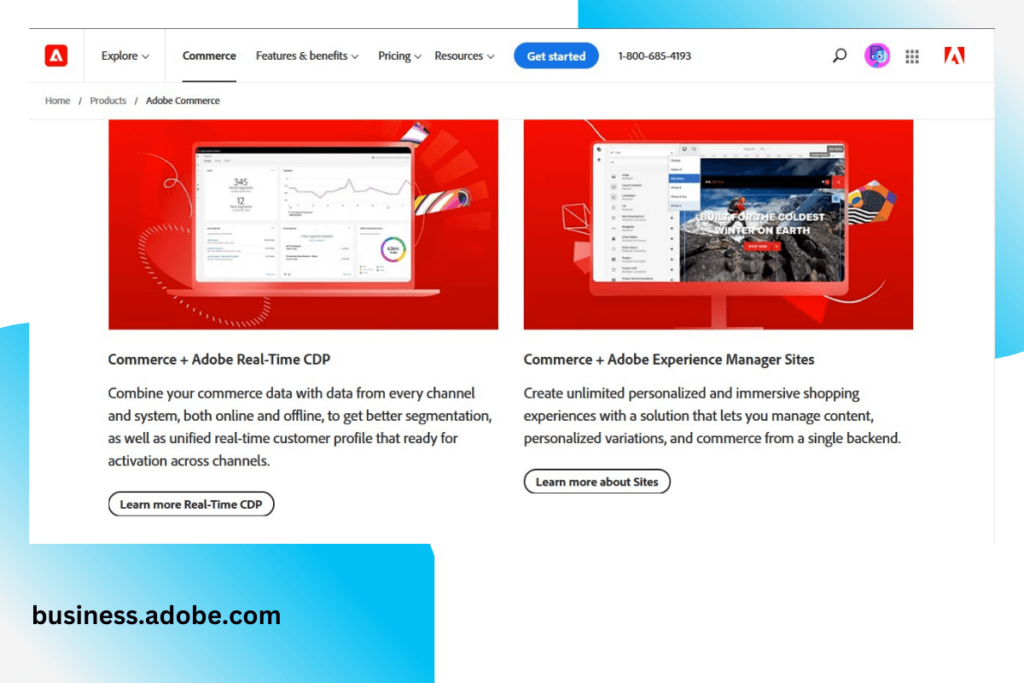
Magento is an open source e-commerce platform used by companies to sell their products online. It is fit for different businesses, from small startups to multinational enterprise brands. Magento accounts for a large percentage of e-commerce destinations, making it widely known among new businesses and developers alike. It allows you to fully customize your storefront, and run it on your own server or on a Magento host of choice.
Why it’s great: Magento’s e-commerce platform provides a flexible shopping cart system, as well as enables control over the look, content, and functionality of your online store. It offers a great marketing platform and prioritizes search engine optimization.
For businesses poised for growth, Magento allows shops with only a few products and simple needs to easily expand to a higher number of products without changing platforms. The platform also offers a variety of plug-ins and themes, which can easily enhance a customer’s experience.
What Magento does well, thanks to its more than a decade in the e-commerce space, is prioritize search engine optimization to make sure its business owners’ shops get found. And as any online business owner knows, this is the key to growth and success in the digital space.
Along with enhanced SEO, Magento also excels at customer experience. Sites load quickly, run smoothly, and tech support is readily available through Magento’s parent company, software industry powerhouse Adobe.
How much does it cost? Pricing varies greatly based on business needs.
3. OpenCart
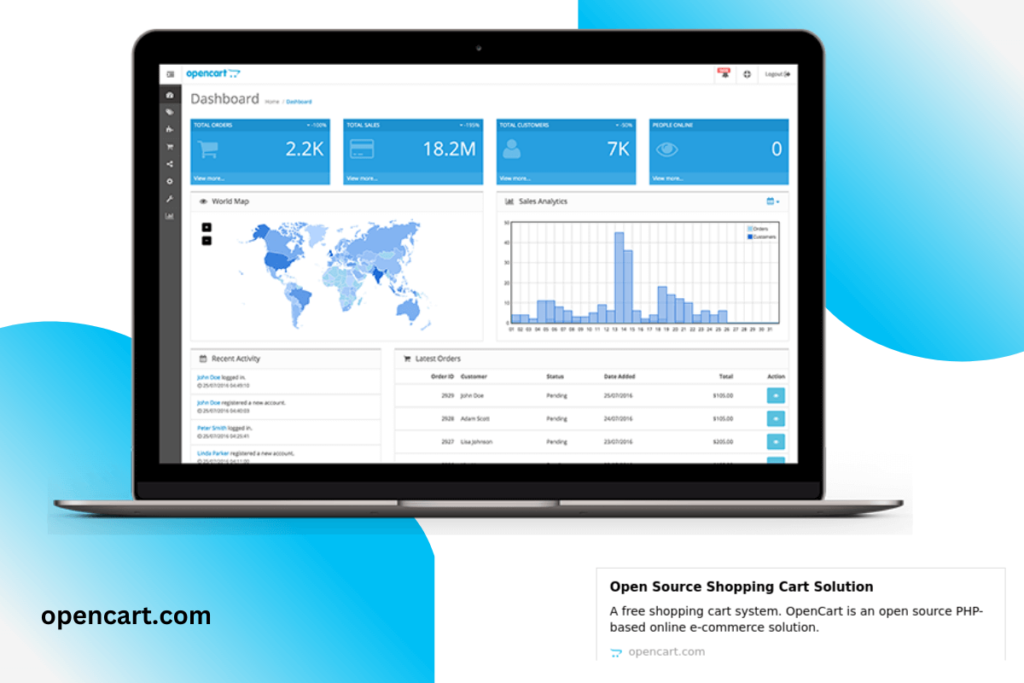
OpenCart is a PHP-based, open source e-commerce solution that allows business owners to run an online store and showcase their products. OpenCart is available to anyone for free. What’s more, you can modify the coding as you deem necessary, and also get free lifetime support as well as software updates.
Why it’s great: OpenCart gives you access to all the essential features you need to kick-start, develop, and grow your business. It is quite easy to learn and manage. The platform perfectly accommodates small and medium businesses working on growth as well as large, well-known corporations.
It has a wide variety of baseline features, and additional features can be easily added using extensions. OpenCart also offers a great number of payment gateways.
With an advanced reporting system, this all-in-one e-commerce solution can manage multiple products and storefronts at once, hence ensuring management of all your different online stores under one administrative panel. Stores can even be divided up by different locations with their own default language, currency, and taxation class settings. Moreover, shop owners can manage a single inventory for their different stores under one roof.
How much does it cost? OpenCart is a free open-source software, however certain add-ons and upgrades will incur charges.
4. PrestaShop
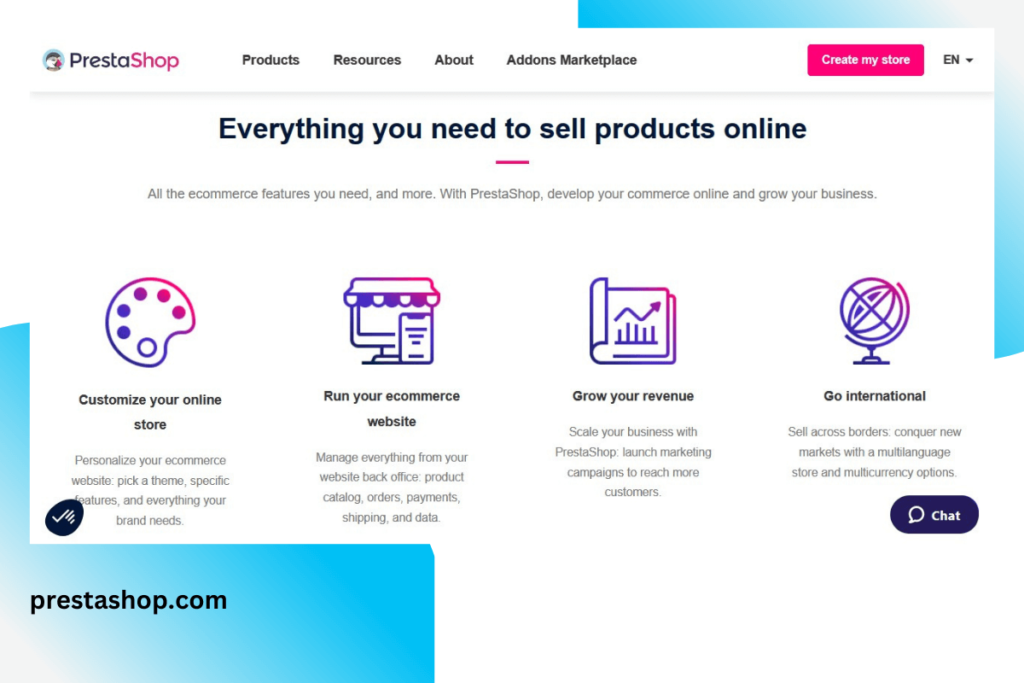
PrestaShop is the open source e-commerce platform that more than 300,000 businesses trust to host their online storefronts. Designed to help businesses to customize their store, drive new and returning customers, attract visitors, and sell globally, it’s regarded as one of the best platforms on the market.
Why it’s great: PrestaShop’s availability in more than 75 different languages gives it a reputation as a must-have platform for international e-commerce businesses. Merchants can reliably host their shop and reach a varied customer base on a global scale.
Stores are fully-customizable, and designed to be set up in just a few clicks, meaning any business owner, whether a developer or a newbie to the tech space, can use the platform with ease and find success in their business.
The PrestaShop Experts marketplace offers shop owners a robust ecosystem of more than 1 million community members, over 1000 contributors, and 250+ agencies at the ready to assist and enable merchants to build their e-commerce stores.
How much does it cost? The basics of PrestaShop are free, however many themes, add-ons, and even advanced customer support require fees.
5. OsCommerce
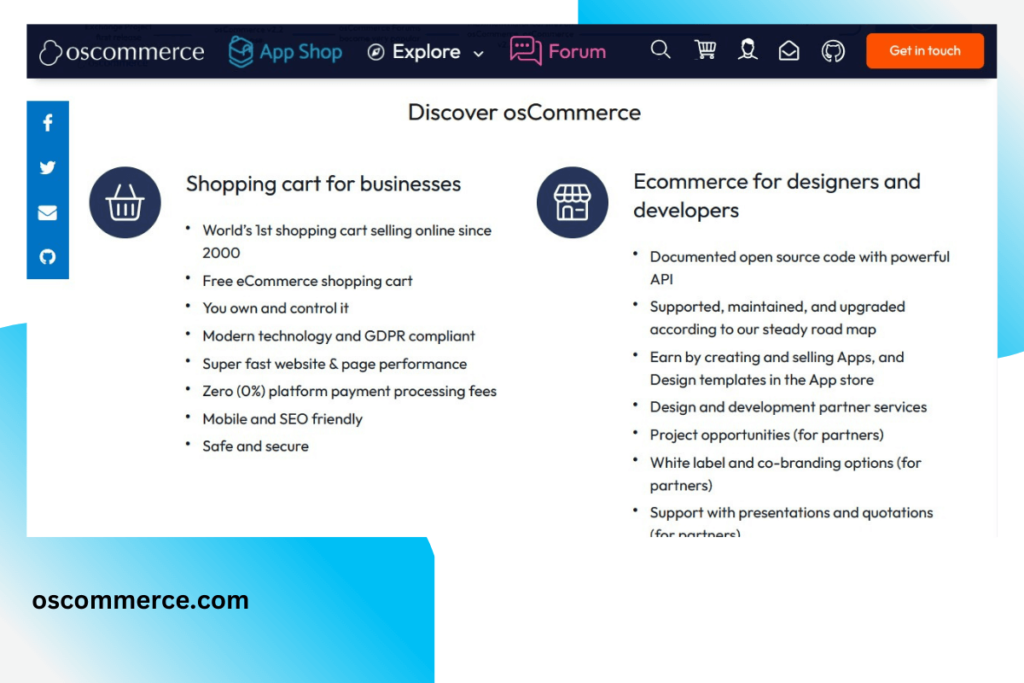
OsCommerce is an open source software that largely aids businesses in the monitoring and management of their online storefronts. The platform provides great features and downloads that ease out the pressure of setting up a new online store, which is why it’s the go-to for more than 350,000 store owners and counting.
Why it’s great: osCommerce enables product display, multi-language, different currencies, search options, and reviews for various products. The platform boasts a robust marketplace of store owners, developers, and service providers there to help businesses at every stage of their growth.
The osCommerce Online Merchant platform offers a complete solution for businesses looking to launch an e-commerce shop, including a shop frontend and an administration backend that can be easily customized and configured to fit businesses specific needs.
How much does it cost? osCommerce offers no-cost access to more than 9,000 free add-ons to customize online shops.
6. Odoo
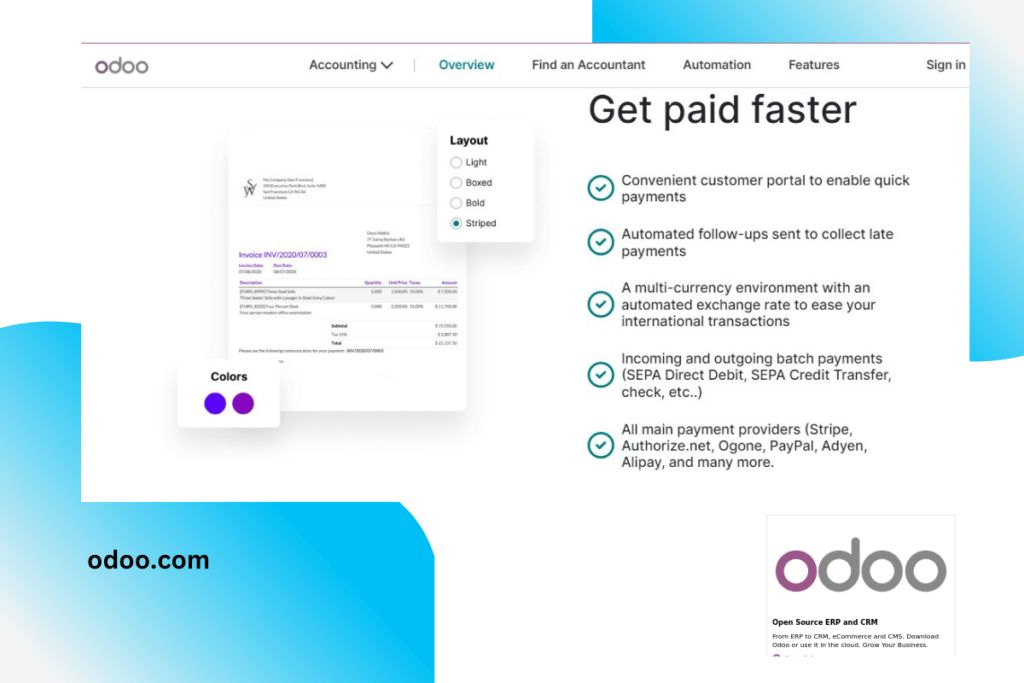
Odoo incorporates many business processes and data sets into one, making it a robust business management tool. It allows users to publish products and is utilized by many companies for online store and catalog needs.
Why it’s great: Odoo is considered the one-stop solution for all e-commerce business needs. The software operates from one platform, providing its users with the ability to manage and monitor all the details of the business under one roof.
For those with a brand vision in mind, Odoo also displays appealing product pages. The module lets you build beautiful storefronts and product pages that can be fully customized, from the look, layout, color, and theme, making it feel fully branded and totally custom.
Odoo’s product management capabilities are seamless. Its integration streamlines the task of designing product listings, managing payment gateways, editing product details, and maintaining customer databases in one place, and it also offers the convenience of one checkout, making the transactions smooth and user-friendly for both the merchant and the customer.
Odoo gives room for business owners to collect reviews on their products and feedback from their customers, which paired with the available sales data and other measured metrics, allows them to better strategize business needs and react to sales trends in order to grow and expand.
For businesses with multiple storefronts, the Odoo platform offers multi-store management. The inventory operations of your multiple stores are closely controlled, observed, and monitored for you for a hands-off store management experience.
How much does it cost? Odoo offers an a-la-carte menu of monthly pricing options based on the specific add-ons in your online store.
7. Zen Cart

Zen Cart is an open source e-commerce software that is user-friendly, free, and designed to put the needs of merchants and their shoppers’ requirements first.
Why it’s great: Zen Cart prides itself on being user-friendly, with merchant-first design needs and easy-to-customize features. Thanks to its open source programming, shop owners can totally customize the source code and make their shop look, feel, and run however they choose.
Many popular payment gateways are built in and able to be integrated, allowing shop owners to start accepting payments immediately. And for those who wish to integrate a custom payment module, there are hundreds of community-contributed ones available to choose from, or the option is there to build your own for the more development-minded store owners.
Zen Cart’s software works with just about any hosting company, so businesses can host their sites on any platform they’d like without complication, and choosing a custom domain name is not a problem either.
How much does it cost? Zen Cart is available to download for free, with add-ons and other plug-ins available separately.
8. Bagisto
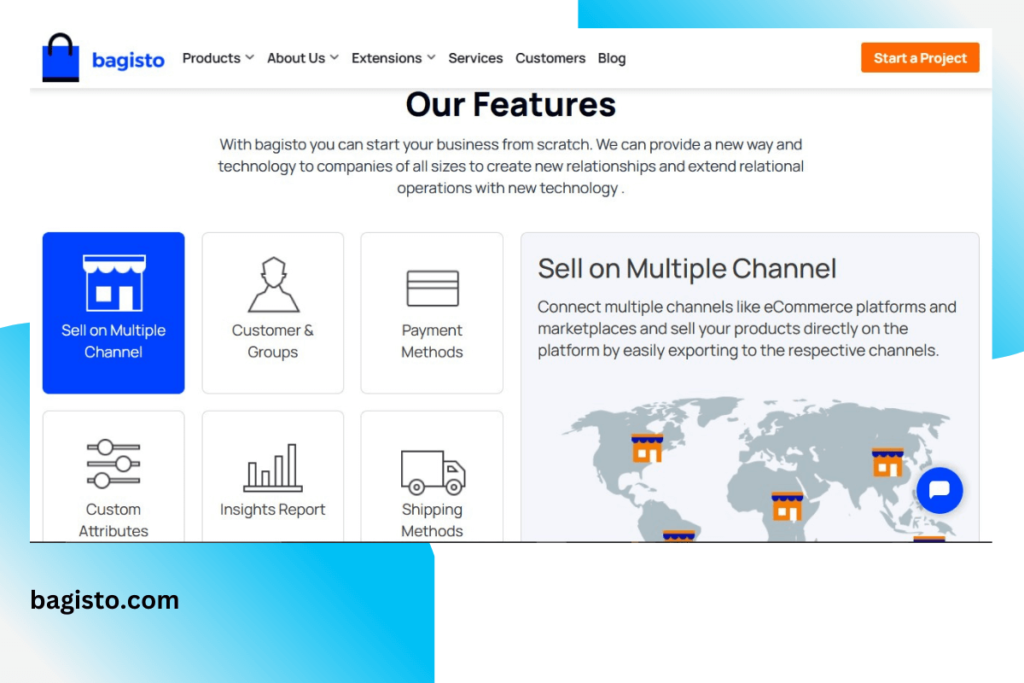
Bagisto is a free and open source e-commerce ecosystem built on Laravel, and is designed to build and scale one’s business, offering a wide range of functionality and letting you have total control of your online store.
Why it’s great: Bagisto’s multi-vendor marketplace and multi-store functionality set it apart from other platforms on the market, thanks to its focus and prioritization on making managing multiple storefronts easy. It can be a one-stop solution for customers looking to get different purchase options from multiple vendors in one place. The multi-store inventory functionality makes it simple to manage multi-channel inventories under one umbrella, and easily track product stock across different physical or digital locations.
Product SEO is enriched on Bagisto thanks to optimized product descriptions, metadata, titles, keywords, and more, helping to ensure products in your shop appear at the top of searches and reach your potential customer base easily and efficiently.
Bagisto’s extension marketplace enables business owners to customize their store’s features specifically to their needs. Extensions vary widely, making the platform a great choice for business in just about any industry and include shipping integrations, restaurant point-of-sale system integrations, payment gateway integrations, eBay connector, dropshipping capabilities, and more.
Google’s core web vitals enable business owners to keep a pulse on the effectiveness of their shop and identify room for improvements. Continuous monitoring of your website and analysis of customer experience provides guidance to Bagisto merchants, enabling them to improve their store experience for customers and enhance business productivity.
How much does it cost? Pricing begins at $9.99 per month, and marketplace extensions are an additional cost.
For business owners looking for open source platforms to host their e-commerce storefronts, there are a multitude of different options on the market. Thanks to the highly customized nature of open source solutions, they make a great option for anyone who prefers to piece together the exact features they need, without worrying about anything they don’t.
When searching for the right open source e-commerce platform, it’s important to research which offer the best features at the right prices, and which are able to be used best to match your web development skill set. By checking out these recommendations and exploring the many offerings available on the market, you’ll be able to find the right open source e-commerce platform to help your business grow and succeed in the online marketplace.
